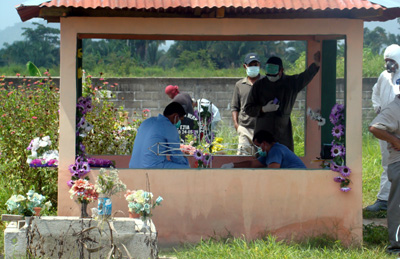In a letter to the editor published Sunday in The New York Times, Honduran minister on human rights Ana Pineda took issue with the findings of CPJ’s recent special report on the murders of seven local reporters this year. Our report, which the Times detailed in a July 27 story, found a pattern of botched and negligent investigative work by Honduran authorities, which has fostered a climate of impunity in attacks on the press. In her letter, Pineda asserted that “all cases have been fully investigated,” but her claim appears to be flawed.
Pineda’s letter said authorities have issued arrest warrants in four of seven cases, and that a “trial is under way” in one case. We reached out to Pineda this week and requested that she specify the cases in which authorities have taken action. In a written response today, Pineda did cite four cases–but two of them were cases from earlier in the decade that were not subjects of CPJ’s report.
She did point to two 2010 cases that were subject of our report: David Enrique Meza Montesinos, and Jorge Alberto Orellana. Our report noted that warrants had indeed been issued in the cases, although we also pointed out that the suspects in the Meza case had not been apprehended.
In her response to CPJ, Pineda identified the Orellana case as the one in which a trial is “under way.” But Elvis Gutiérrez, a spokesman for the San Pedro Sula prosecutor’s office, told CPJ this week that the trial won’t take place for another 18 months to two years.
As for Pineda’s claim that all cases have been “fully investigated,” the probe into the murder of prominent television anchor Nahúm Palacios Arteaga is instructive. No autopsy was conducted in the aftermath of the murder, no crime scene photos were taken, and no forensic evidence was gathered from the site of the murder, CPJ’s Mike O’Connor reported from Honduras. An autopsy was finally done–three months after the murder. CPJ representatives witnessed the graveside autopsy, which was conducted after the body was exhumed.
Why was an autopsy done so late? The Honduran government, seeking to mollify international critics concerned about the rash of journalist murders, had called for help from the U.S. Federal Bureau of Investigation. At the graveside, a local prosecutor acknowledged to CPJ that authorities needed to show the FBI something. They had virtually no other evidence.
Our concern in all of the journalist murders is that Honduran authorities have sought to minimize the climate of impunity in anti-press violence and dismiss the political motives behind such actions. By asserting in her letter to the Times that the killings were the product of “organized crime and common crime,” Pineda seems to show that the government is not yet ready to confront the facts.
